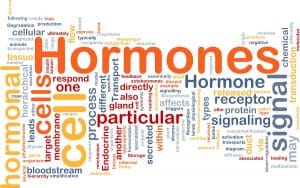Before puberty, the rates of mood and anxiety disorders are similar in boys and girls. It's only after females begin menstrual function that a gender differential in mood disorders manifests itself. This, coupled with the observation that women appear to be especially vulnerable to mood disturbances during times of hormonal flux, certainly confirms that a relationship exists between sex hormones and mood.
How Do Hormones Affect Mood?
Levels of hormones, such as those produced by the thyroid gland, can be factors in depression. In addition, some symptoms of depression are associated with thyroid conditions. The same is true about conditions related to the menstrual cycle, such as premenstrual syndrome (PMS), perimenopause, and menopause.
The process of menstruation involves fluctuations in the levels of estrogen and other hormones. Some women experience depression-related symptoms such as sadness, irritability, and fatigue prior to menstruation. These symptoms are part of the premenstrual syndrome, or PMS. A more severe case of emotional problems related to menstruation is known as premenstrual dysphoric disorder (PMDD).
When pregnant, women are subject to physical and emotional changes caused in part by changes in hormones. After pregnancy, women experience a huge shift in hormone levels. This shift is a likely cause of the "baby blues," a mild type of depression that immediately follows childbirth and resolves quickly. A more severe form of depression — post-partum depression — could also result.
When women get older and move out of child-bearing years, they experience changes in hormone levels. These changes happen during perimenopause and menopause. Symptoms that occur during this time of life could include fatigue, sleep disturbances, weight gain, and skin changes.
Watch this video of Dr. Andrew Petersen from Holtorf Medical Group talking about the important link between hormones and depression:
The Role Of Hormones In Mood Behavior
Estrogen can help improve your mood via its effect on serotonin, a neurotransmitter that is active in the brain. Low levels of serotonin can lead to depression, anxiety and difficulty sleeping, as well as affecting how you experience pain. Estrogen, however, helps in the formation of this neurotransmitter, bringing it back to optimal levels.
Progesterone, on the other hand, has a very calming effect. Progesterone affects the GABA receptors in the brain, calming you and helping you to sleep. Natural progesterone, in general, can also help alleviate mood swings, irritability and depression.
Testosterone can have a significant impact on mood, as well. It helps with one's sense of well-being and self-confidence, which are important aspects to a positive mood. In fact, depression and anxiety are well-known symptoms of low testosterone.
Consistently high levels of cortisol, the stress hormone, can deplete the adrenal glands. They don't have a chance to recover, so your cortisol levels remain low even when stress is present. During this state, which is known as adrenal fatigue, you may experience many mood-related symptoms, including depression, anxiety, insomnia and difficulty handling stress.
Your thyroid hormones are also important to your mood. Depression is a well-known symptom of hypothyroidism.
Balancing your hormones requires comprehensive testing and careful observation.


